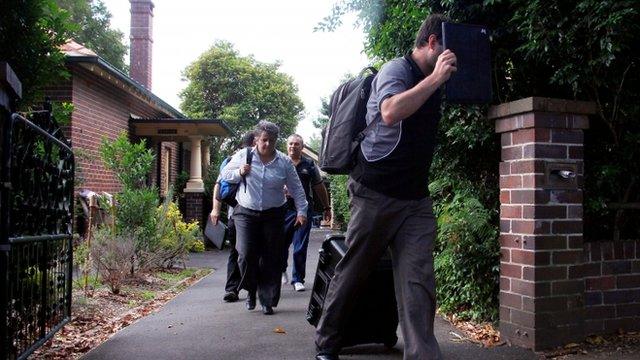Has Craig Wright proved he's Bitcoin's Satoshi Nakamoto?
- Published

Australian entrepreneur Craig Wright told BBC's Rory Cellan-Jones that he is Bitcoin's founder
Scepticism has greeted a claim by Craig Wright that he is the inventor of Bitcoin. His claim has been subjected to scrutiny on social media, discussion forums and message boards. Many say the evidence has been found wanting.
I missed it, what happened?
On 2 May, Australian entrepreneur Craig Wright publicly claimed to be the creator of the Bitcoin virtual currency.
In interviews with the BBC, the Economist and GQ, he said he was the man behind Satoshi Nakamoto - the pseudonym used by whoever dreamed up Bitcoin in email exchanges with cryptographers and developers in the early days of the virtual currency.
His claim was backed by Gavin Andresen, chief scientist at the Bitcoin Foundation, and Jon Matonis, an economist and a founding director of the same organisation.

Bitcoin uses electronic signatures to prove ownership and prevent double-spending
This is about cryptography, so did he provide proof?
Some. In demonstrations to the Bitcoin experts, the BBC and the Economist, he used the Electrum Bitcoin wallet to sign a message using private keys from early Bitcoin blocks widely assumed to belong to Satoshi Nakamoto.
But as the Economist said in its report, external about Mr Wright, such demonstrations can be "stage-managed" and many doubters have said it was poor practice to let him use his own laptop and software of his choosing for this demonstration.
However, Mr Andresen's encounter with Mr Wright was more rigorous. In that case, a Windows laptop was bought from a nearby shop, unboxed and the Electrum wallet software installed on it.


Australian entrepreneur Craig Wright says he is Mr Bitcoin
Mr Wright then signed an arbitrary message - "Gavin's favorite number is eleven. CSW" - with a key from an early block. The signed message was put on a USB stick, moved to the new laptop and checked. This revealed the signature to be valid.
Is that all?
No. In addition, Mr Wright also posted information on his blog, external that he said would show that he was Satoshi, again because of the digital signature linked to those early blocks.
Many people jumped on this evidence and soon after revealed that there was no digital signature in it. Instead, it uses a short list of numbers any competent Googler could find. The string of numbers, external comes from a 2009 bitcoin transaction carried out by Satoshi.
Where does this leave us?
In limbo. On the one hand, we have two key figures in the Bitcoin community convinced Craig Wright is Satoshi. Others have joined them, external.
On the other, we have a huge number of sceptics utterly unconvinced, external by evidence that is very weakly linked to Satoshi. Developer Patrick McKenzie, external pointed out that anyone could use it to claim they were Bitcoin's progenitor.
Mr Andresen did entertain the possibility that he has been "bamboozled" by an elaborate effort to make the test he saw look more real than it actually was. But, he said, he was still convinced that Craig Wright is Satoshi.
How could this be resolved?

Mr Wright could quash some of the debate by spending some early bitcoins
With more proof. Many, including the BBC's Rory Cellan-Jones, have called on Craig Wright to spend some of the bitcoins locked up in those early blocks to demonstrate that he has control of them.
However, as others have pointed out, all this would show is that he has access to the private keys for these bitcoins, not that he was Satoshi.
Some suggest the confusion around Satoshi's identity has arisen because it was a name adopted by the small group of developers that worked on Bitcoin in its early days. This group involved Mr Wright, Hal Finney and David Kleiman. As the only surviving member of that group Mr Wright could claim to be Satoshi but would not have access to all the data that could be used to definitively prove this assertion.
Bitcoin scientist Gavin Andresen said on Monday that he believed Craig Wright's claim
The Economist has publicly called, external on Mr Wright to provide more proof. That could soon be forthcoming, said a statement from his PR agency.
"In the coming days Dr Wright will provide further evidence as to him being Satoshi and the creator of Bitcoin by moving a coin from an early block."
Are there any other candidates that could be Satoshi?

Ross Ulbricht, who ran the Silk Road underground marketplace, was named as a potential Satoshi
Not really. Bitcoin watchers and journalists have been seeking the man behind Satoshi for years. During that time the focus has fallen on Finnish economists, Japanese mathematicians, cybercriminals and Japanese-American physicists. All the people named in those searches have denied being Satoshi.
In December 2015, Wired and Gizmodo put forward Craig Wright's name as a potential candidate after receiving documents and emails reportedly stolen from him that showed his involvement with the virtual currency.
After reviewing the evidence, Wired remained unsure, saying, external: "Either Wright invented bitcoin, or he's a brilliant hoaxer who very badly wants us to believe he did."
Why would anyone go to these lengths?

Mr Wright's home in Australia has been raided by tax investigators
We don't know. Critics of Mr Wright point to his continuing dispute with the Australian tax authorities as one reason why he might need a way to explain away his possession of large amounts of bitcoins.
For his part Mr Wright said he is undergoing audits by the Australian Tax Office over the amount of tax he has to pay but this is complicated by the fact that the ATO does not understand bitcoins and how they might be valued.
Why does this matter?
Because Bitcoin has become much more than just a technology project. There is a definite libertarian ideology bound up with it. Some commentators have suggested it is so toxic that it deserves to "die in a fire, external".
Also, Bitcoin's community is currently debating how the currency itself should evolve. Some want it to remain a pure net-connected currency but others, including Craig Wright, want it to become a more general payment system. If Mr Wright was confirmed as Satoshi he could lend weight to one side of the debate.
Indeed, he said, during all the years of silence he has not been idle. Instead, he has many ideas about how to expand the reach of Bitcoin and its underlying blockchain accounting system.
- Published2 May 2016

- Published2 May 2016

- Published2 May 2016

- Published2 May 2016
